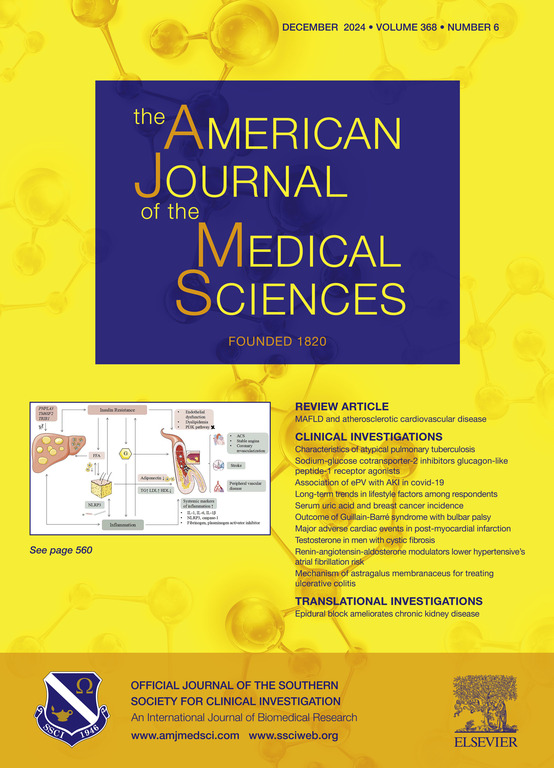Epidural block with lidocaine ameliorates kidney function deterioration and fibrosis of chronic kidney disease in rats
IF 2.3
4区 医学
Q2 MEDICINE, GENERAL & INTERNAL
引用次数: 0
Abstract
Background
According to evidences from clinical practices and experiments, renal denervation achieved by removing both the afferent and sympathetic nerves has therapeutic impacts on poor renal function and hypertension in chronic kidney disease (CKD). Epidural anesthesia is presumed to function on the target spine segments with a complete sympathetic block. Based on this perspective, we hypothesized that epidural block with lidocaine could ameliorate renal injury in CKD rats.
Method and Results
Male Sprague-Dawley rats weighing 250–300 g were randomized into four groups: control, CKD, CKD + sham, and CKD + epidural block with lidocaine groups. CKD was induced by resection of the lower and upper thirds of the left kidney followed by right nephrectomy one week later. Significant differences in renal function, sympathetic activation as well as renal fibrosis parameters were observed between CKD and control rats. These parameters corresponded with typical phenotypes of CKD rats. Epidural block with lidocaine improved renal function as well as renal fibrosis, and reversed the abnormalities of the renal function and cardiovascular parameters either fully or partially.
Conclusion
Epidural block with lidocaine confers renal protection, which is presumably mediated by decreasing sympathetic nerve activities in the renal region and other target organs in CKD.
利多卡因硬膜外阻滞可改善慢性肾功能衰竭大鼠的肾功能恶化和纤维化。
背景:根据临床实践和实验证明,通过切除传入神经和交感神经实现的肾脏去神经化对慢性肾脏病(CKD)患者的不良肾功能和高血压有治疗作用。硬膜外麻醉被认为是在完全阻断交感神经的情况下对目标脊柱节段发挥作用。基于这一观点,我们假设用利多卡因进行硬膜外阻滞可改善 CKD 大鼠的肾损伤:将体重为 250-300 克的雄性 Sprague-Dawley 大鼠随机分为四组:对照组、CKD 组、CKD + 假组和 CKD + 利多卡因硬膜外阻滞组。诱导 CKD 的方法是切除左肾的上下三分之二,一周后再切除右肾。观察到 CKD 大鼠和对照组大鼠在肾功能、交感神经激活和肾纤维化参数方面存在显著差异。这些参数与 CKD 大鼠的典型表型相符。利多卡因硬膜外阻滞改善了肾功能和肾纤维化,并完全或部分逆转了肾功能和心血管参数的异常:结论:使用利多卡因进行硬膜外阻滞可提供肾脏保护,这可能是通过降低 CKD 肾区和其他靶器官的交感神经活动来实现的。
本文章由计算机程序翻译,如有差异,请以英文原文为准。
求助全文
约1分钟内获得全文
求助全文
来源期刊
CiteScore
4.40
自引率
0.00%
发文量
303
审稿时长
1.5 months
期刊介绍:
The American Journal of The Medical Sciences (AJMS), founded in 1820, is the 2nd oldest medical journal in the United States. The AJMS is the official journal of the Southern Society for Clinical Investigation (SSCI). The SSCI is dedicated to the advancement of medical research and the exchange of knowledge, information and ideas. Its members are committed to mentoring future generations of medical investigators and promoting careers in academic medicine. The AJMS publishes, on a monthly basis, peer-reviewed articles in the field of internal medicine and its subspecialties, which include:
Original clinical and basic science investigations
Review articles
Online Images in the Medical Sciences
Special Features Include:
Patient-Centered Focused Reviews
History of Medicine
The Science of Medical Education.

 求助内容:
求助内容: 应助结果提醒方式:
应助结果提醒方式:


